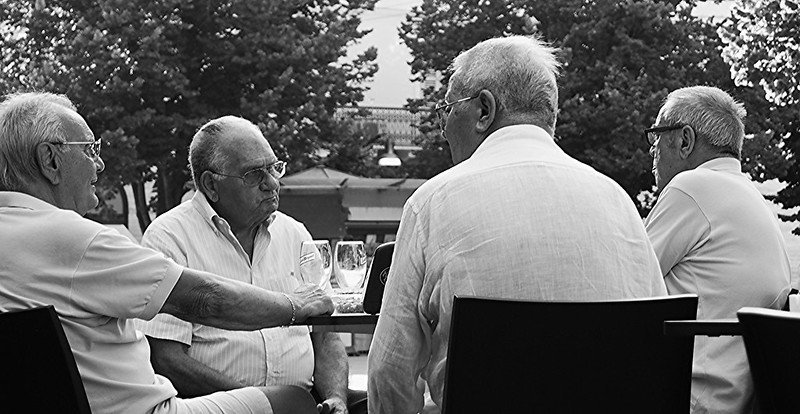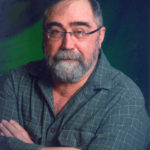
THE TERM “FRIENDSHIP,” for Americans, is a very broad and nebulous concept. Where I currently live, many people (whom I consider casual acquaintances) call me a friend just because we exchange “Hellos.” I lived in West Germany for most of the 1970s, where I learned that Germans’s definition of a friend was much narrower, closer to what Americans might call a close friend. I have absorbed this alternative sense of friendship and have kept a distinction between “friend” and ”acquaintance,” even while adhering to American social norms and calling many people friends who are in fact acquaintances.
In Germany, I had a close, warm, mutually supportive, and trusting circle of friends, a mix of gay and straight people who are still my friends almost fifty years later. When I moved from Tuebingen to the Castro District of San Francisco, I found myself having all gay (and lesbian and trans) friends. Suddenly, friendships came quickly and easily, I had many more of them. One common path to friendship for me was to befriend many of the guys that I tricked with. I entered a vast network of complex relationships, different from the heterosexual world that I’d grown up in. This grew into my (mostly gay) “family of choice,” what I call my “gay family.”
Against my better instincts, I was forced to relocate to my rural childhood home in the Northeast, far from my close friends on the West Coast and in Europe. It was here that I developed the habit of calling passing acquaintances friends. In the eight years I have lived here, I have made only one friend, what Aristotle calls a “useful” friend. I have many social acquaintances here. I socialize a lot, I move in many circles. I am by nature shy and introverted, but try to be friendly and easy-going, and to meet people at their own level (something classroom teaching taught me). I have missed my gay friends and gay community, the feeling of being safe in an extended family of choice. With the social isolation of the current pandemic, everyone can now relate to that sense of social disconnectedness.
After these years of frustration, sometimes mixed with anger or despair, I obsessively reviewed the history of my friendships over a lifetime, trying to understand why I was failing to make new friends. I decided to do some research. I came across Peter Nardi’s Gay Men’s Friendships: Invincible Communities. Published over twenty years ago, it remains the only systematic study of gay men’s friendships.
Nardi notes that Aristotle defined three kinds of “civic” friendship: useful, pleasurable, and good (the ideal). Useful friendships are based on “the good accruing to each from the other,” not necessarily mutual affection. They come and go quickly and prevail among the young and the elderly. Pleasurable friendship is based more on emotion, for the pleasure given, not for who the person is. It is most common among young men in their prime.
The basis of friendship (especially among gay men), according to Nardi, is loyalty, intimacy, reciprocity, trust, authenticity, similarity, sharing, acceptance, and support. Nardi finds that gay men’s friendships combine straight men’s friendships and women’s friendships. Men focus on mutual interests and shared experience, are low in self-disclosure, low in physically-expressed affection, and focus on topics for discussion that are external (news, sports, work), and they do not spend a lot of time with each other or stay in touch by phone (or internet).
Women (according to Nardi) focus on intimate self-disclosure and mutual aid (and talking about the friendship itself) and on relationship problems. They allow physical expressions of intimacy, and provide emotional support to each other.
Gay men will recognize both modes in their friendships, partly because gay men have historically been social outcasts, and partly because sex is often complexly interwoven into friendship. Friendship often arises from a casual sexual encounter. Some gay men have “fuck buddies,” where friendship may take root. Gay men have historically had a network of mutual aid, helping a friend find a job or a gay-friendly landlord, providing emotional support following a breakup or other personal crisis. Gay communities arose from networks of personal friendships. Gay men came together during the AIDS epidemic, when mainstream society turned a blind eye. We only had each other to rely on. Friendship among gay men was not only a wonderful thing but necessary for our survival in a hostile world.
Lovers I had hoped would become my life partner have come and gone. It has been my gay family that has sustained me and stayed with me. Nowadays, with the mainstreaming of gays and lesbians and the formal establishment of every sort of professional support, young gay men would seem to have less need for support from gay friendships and gay community. The Internet and social media have replaced much of what used to happen face-to-face. Finding myself, as an old gay man, invisible in relevant social media spaces, I am unable to ascertain how younger gay men create community there.
Today, I continue to live with the deeply ingrained need for gay male friendships. These are the people who truly understand me. These are the people, for the most part, that I have relied on in times of need. Old people have a hard time making new friends. In America they’re typically viewed as nonproductive burdens on society, whose life experiences are irrelevant. They face ageist prejudice in the gay community. We often (as in my case) end up poor, lonely, and isolated.
During the pandemic, I have deepened some long-term friendships and renewed others that had faded with time and distance. My gay family still includes treasured straight friends from long ago. It has taken me years to make peace with my current living situation, but I continue to cast about and hold out hope that this will not be the last stop, that I will again find my way to a community where I feel connected, understood, truly accepted for who I am, where I can engage in meaningful community involvement. Promising leads have come and gone. I live with hope, not expectation. And, if this is the final chapter, I can accept that. There is a saying. “If you want to make God laugh, tell Him what your plans are.”
Les K. Wright is a retired professor of English and Geman, gay historian, and gay activist. He is the founder of the Bear History Project, editor of The Bear Book and The Bear Book II, and founding member and founding board member of the LGBT Historical Society San Francisco.







Discussion2 Comments
Mr. Wright,
Thank you for your fantastic, moving and inspirational article. Your heart come through beautifully in your writing.
I wish you great and huge success in all that you do !
Respectfully,
Ruben Acevedo
San Antonio, TX.
Thank you for this thoughtful essay, Les. I lived in a rural area for a decade and, while it was an idyllic setting for writing and hiking, the isolation became too much. Ultimately, I decided it was a nice place to visit but I couldn’t continue living there. While I’m an extreme introvert who got what I asked for, it proved to be too much of a good thing.
Living in a city again, I am now at that stage in life where I do feel irrelevant in gay circles. There’s something freeing about that. I haven’t ironed a shirt in years! Still, it’s off-putting, given that the gay “community” was supposed to be a haven of support and acceptance. Wish that didn’t come (if it did at all) with an expiration date. I’ve written a novel (currently unpublished) called Dead in Gay Years because I think so many might relate to that sense of having aged out.
Keep hoping and keep leaning on the friendships you’ve built and nurtured even though they’re not so close to home for now.
All the best,
Gregory Walters